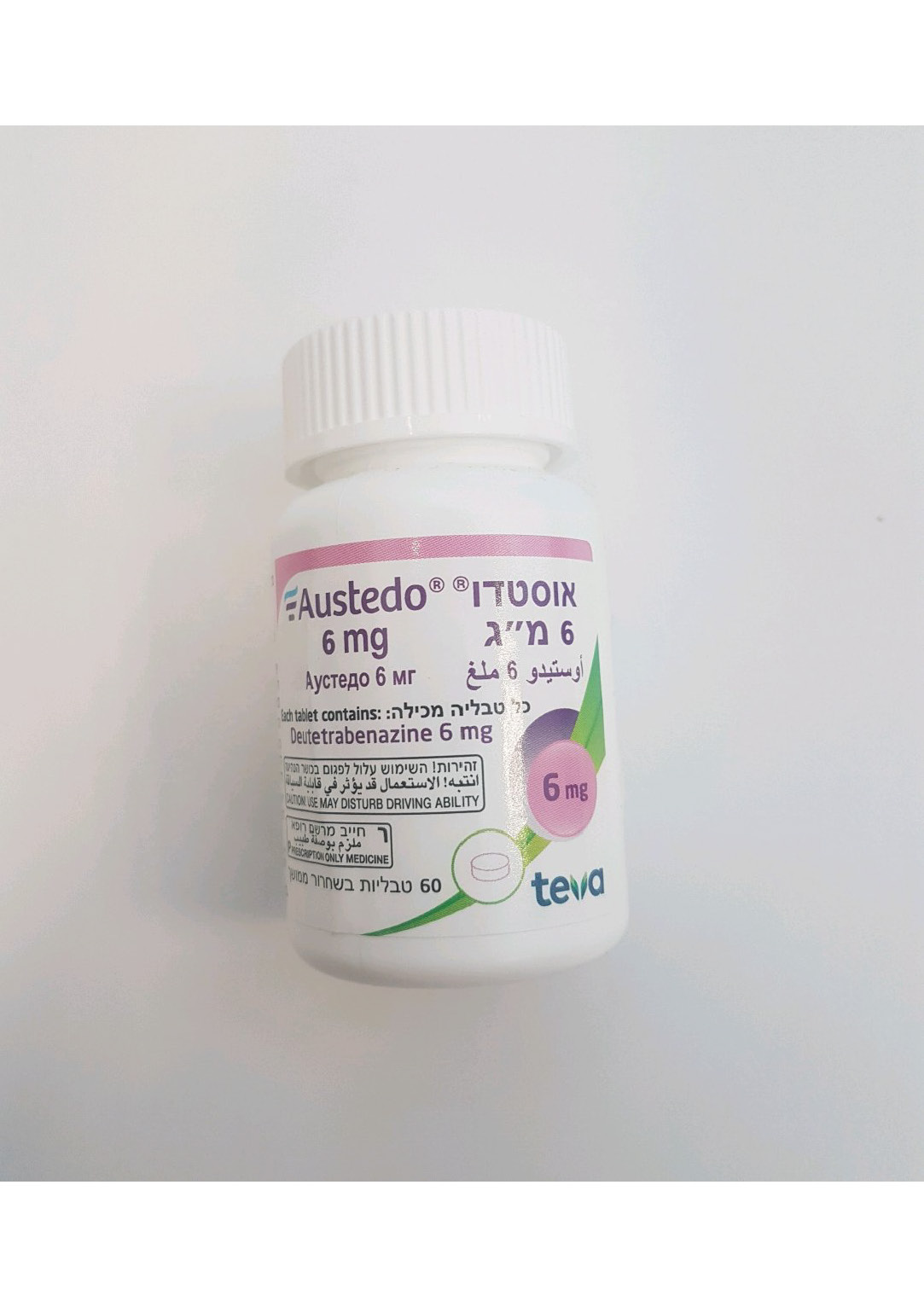Quest for the right Drug

אוסטדו 6 מ"ג AUSTEDO 6 MG (DEUTETRABENAZINE)
תרופה במרשם
תרופה בסל
נרקוטיקה
ציטוטוקסיקה
צורת מתן:
פומי : PER OS
צורת מינון:
טבליות עם שחרור נרחב : TABLETS EXTENDED RELEASE
עלון לרופא
מינוניםPosology התוויות
Indications תופעות לוואי
Adverse reactions התוויות נגד
Contraindications אינטראקציות
Interactions מינון יתר
Overdose הריון/הנקה
Pregnancy & Lactation אוכלוסיות מיוחדות
Special populations תכונות פרמקולוגיות
Pharmacological properties מידע רוקחי
Pharmaceutical particulars אזהרת שימוש
Special Warning עלון לרופא
Physicians Leaflet
Adverse reactions : תופעות לוואי
6. ADVERSE REACTIONS The following serious adverse reactions are discussed in greater detail in other sections of the labeling: • Depression and Suicidality in Patients with Huntington’s disease [see Warnings and Precautions (5.1)] • QTc Prolongation [see Warnings and Precautions (5.3)] • Neuroleptic Malignant Syndrome (NMS) [see Warnings and Precautions (5.4)] • Akathisia, Agitation, and Restlessness [see Warnings and Precautions (5.5)] • Parkinsonism [see Warnings and Precautions (5.6)] • Sedation and Somnolence [see Warnings and Precautions (5.7)] • Hyperprolactinemia [see Warnings and Precautions (5.8)] • Binding to Melanin-Containing Tissues [see Warnings and Precautions (5.9)] 6.1 Clinical Trials Experience Because clinical trials are conducted under widely varying conditions, adverse reaction rates observed in the clinical trials of a drug cannot be directly compared to rates in the clinical trials of another drug and may not reflect the rates observed in practice. Patients with Huntington’s Disease Study 1 was a randomized, 12-week, placebo-controlled study in patients with chorea associated with Huntington’s disease. A total of 45 patients received AUSTEDO, and 45 patients received placebo. Patients ranged in age between 23 and 74 years (mean 54 years); 56% were male, and 92% were Caucasian. The most common adverse reactions occurring in greater than 8% of AUSTEDO-treated patients were somnolence, diarrhea, dry mouth, and fatigue. Adverse reactions occurring in 4% or more of patients treated with AUSTEDO, and with a greater incidence than in patients on placebo, are summarized in Table 2. Table 2: Adverse Reactions in Patients with Huntington’s Disease (Study 1) Experienced by at Least 4% of Patients on AUSTEDO and with a Greater Incidence than on Placebo Adverse Reaction AUSTEDO Placebo (N = 45) (N = 45) % % Somnolence 11 4 Diarrhea 9 0 Dry mouth 9 7 Fatigue 9 4 Urinary tract infection 7 2 Insomnia 7 4 Anxiety 4 2 Constipation 4 2 Contusion 4 2 One or more adverse reactions resulted in a reduction of the dose of study medication in 7% of patients in Study 1. The most common adverse reaction resulting in dose reduction in patients receiving AUSTEDO was dizziness (4%). Agitation led to discontinuation in 2% of patients treated with AUSTEDO in Study 1. Patients with Tardive Dyskinesia The data described below reflect 410 tardive dyskinesia patients participating in clinical trials. AUSTEDO was studied primarily in two 12-week, placebo-controlled trials (fixed dose, dose escalation). The population was 18 to 80 years of age, and had tardive dyskinesia and had concurrent diagnoses of mood disorder (33%) or schizophrenia/schizoaffective disorder (63%). In these studies, AUSTEDO was administered in doses ranging from 12-48 mg per day. All patients continued on previous stable regimens of antipsychotics; 71% and 14% respective atypical and typical antipsychotic medications at study entry. The most common adverse reactions occurring in greater than 3% of AUSTEDO-treated patients and greater than placebo were nasopharyngitis and insomnia. The adverse reactions occurring in >2% or more patients treated with AUSTEDO (12-48 mg per day) and greater than in placebo patients in two double-blind, placebo-controlled studies in patients with tardive dyskinesia (Study 1 and Study 2) are summarized in Table 3. Table 3: Adverse Reactions in 2 Placebo-Controlled Tardive Dyskinesia Studies (Study 1 and Study 2) of 12-week Treatment on AUSTEDO Reported in at Least 2% of Patients and Greater than Placebo Preferred Term AUSTEDO Placebo (N=279) (N=131) (%) (%) Nasopharyngitis 4 2 Insomnia 4 1 Depression/ Dysthymic disorder 2 1 Akathisia/Agitation/Restlessness 2 1 One or more adverse reactions resulted in a reduction of the dose of study medication in 4% of AUSTEDO-treated patients and in 2% of placebo-treated patients. Reporting of suspected adverse reactions: Reporting suspected adverse reactions after authorisation of the medicinal product is important. It allows continued monitoring of the benefit/risk balance of the medicinal product. Any suspected adverse events should be reported to the Ministry of Health according to the National Regulation by using an online form: https://sideeffects.health.gov.il

פרטי מסגרת הכללה בסל
א. התרופה תינתן לטיפול במקרים האלה:1. מחלת הנטינגטון עם תנועות לא רצוניות משמעותיות TMC≥8 (total maximal chorea).2. הפרעת תנועה מאוחרת (Tardive Dyskinesia) בדרגת חומרה בינונית- קשה (דירוג total AIMS≥ 6 או מעל 3 נקודות באזור אחד של הגוף).ב. מתן התרופה ייעשה לפי מרשם של מומחה בנוירולוגיה או בפסיכיאטריה.
מסגרת הכללה בסל
התוויות הכלולות במסגרת הסל
| התוויה | תאריך הכללה | תחום קליני | Class Effect | מצב מחלה |
|---|---|---|---|---|
| מחלת הנטינגטון עם תנועות לא רצוניות משמעותיות TMC≥8 (total maximal chorea). | 01/02/2023 | נוירולוגיה | מחלת הנטינגטון, Huntington's chorea | |
| הפרעת תנועה מאוחרת (Tardive Dyskinesia) בדרגת חומרה בינונית- קשה (דירוג total AIMS≥ 6 או מעל 3 נקודות באזור אחד של הגוף). | 01/02/2023 | נוירולוגיה | הפרעת תנועה מאוחרת, Tardive dyskinesia |
שימוש לפי פנקס קופ''ח כללית 1994
לא צוין
תאריך הכללה מקורי בסל
01/02/2023
הגבלות
תרופה מוגבלת לרישום ע'י רופא מומחה או הגבלה אחרת
מידע נוסף
